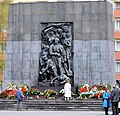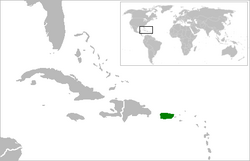Portal:Judaism
The Judaism PortalJudaism (Hebrew: יַהֲדוּת, romanized: Yahăḏūṯ) is an Abrahamic, monotheistic, ethnic religion that comprises the collective spiritual, cultural, and legal traditions of the Jewish people. Religious Jews regard Judaism as their means of observing the Mosaic covenant, which they believe was established between God and the Jewish people. The religion is considered one of the earliest monotheistic religions. Jewish religious doctrine encompasses a wide body of texts, practices, theological positions, and forms of organization. Among Judaism's core texts is the Torah—the first five books of the Hebrew Bible—and a collection of ancient Hebrew scriptures. The Tanakh, known in English as the Hebrew Bible, has the same books as Protestant Christianity's Old Testament, with some differences in order and content. In addition to the original written scripture, the supplemental Oral Torah is represented by later texts, such as the Midrash and the Talmud. The Hebrew-language word torah can mean "teaching", "law", or "instruction", although "Torah" can also be used as a general term that refers to any Jewish text or teaching that expands or elaborates on the original Five Books of Moses. Representing the core of the Jewish spiritual and religious tradition, the Torah is a term and a set of teachings that are explicitly self-positioned as encompassing at least seventy, and potentially infinite, facets and interpretations. Judaism's texts, traditions, and values strongly influenced later Abrahamic religions, including Christianity and Islam. Hebraism, like Hellenism, played a seminal role in the formation of Western civilization through its impact as a core background element of early Christianity. (Full article...) Selected ArticleTefillin (or phylacteries) are a set of small black leather boxes containing scrolls of parchment inscribed with verses from the Torah, which are worn by observant Jewish men during weekday morning prayers. Although "tefillin" is technically the plural form (the singular being "tefillah"), it is loosely used as a singular as well.The hand-tefillin, or shel yad, is placed on the upper arm, and the strap wrapped around the arm, hand and fingers; while the head-tefillin, or shel rosh, is placed above the forehead. The Torah commands that they should be worn to serve as a "sign" and "remembrance" that God brought the children of Israel out of Egypt. The tefillin each contain four portions: Exodus 13:1–10, 13:11–16, and Deuteronomy 6:4–9, 11:13–21, all of which mention the commandment. In the hand-tefillin, these are all written on one scroll, but in the head-tefillin each has its own scroll and compartment. (Read more...) Did You Know?Did you know...
Related Categories
Featured Articles
Related PortalsHistory ArticleThe History of the Jews in Puerto Rico began in the 15th century with the arrival of the anusim (conversos) who accompanied Christopher Columbus on his second voyage. The Jews did not flourish in Puerto Rico because of the Spanish Inquisition, although many migrated to mountainous parts of the island and continued to self-identify as Jews. It would be hundreds of years before an open Jewish community would be established on the island. Very few American Jews settled in Puerto Rico after the island was ceded by Spain to the United States in 1898. The first large group of Jews to settle in Puerto Rico were European refugees fleeing German-occupied Europe in the 1930s and 1940s. The second influx of Jews to the island came in the 1950s, when thousands of Cuban Jews fled after Fidel Castro came to power, the majority immigrating to Miami, Florida, with a sizable portion choosing to establish themselves on the neighboring island because of the cultural and historic ties between the two islands. Puerto Rican Jews have made many contributions in multiple fields, including business and commerce, education, and entertainment. Puerto Rico has the largest and richest Jewish community in the Caribbean, with over 3,000 Jewish inhabitants. It is also the only Caribbean island in which all three major Jewish denominations—Orthodox, Conservative, and Reform—are represented. (Read more...) Picture of the WeekIn the News
Featured Quote
WikiProjectsThings You Can Do
Weekly Torah PortionPinchas (פנחס)
Numbers 25:10–30:1
"Moses spoke to the Lord, saying, ‘Let the Lord, Source of the breath of all flesh, appoint someone over the community . . . so that the Lord's community may not be like sheep that have no shepherd.’" (Numbers 27:15-17.)
God announced that because Phinehas had displayed his passion for God, God granted Phinehas God's pact of friendship and priesthood for all time. God then told Moses to attack the Midianites to repay them for their trickery luring Israelite men to worship Baal-Peor. God instructed Moses and Eleazar to take a census of Israelite men 20 years old and up, and Moses and Eleazar ordered it done. The census showed the following populations by tribe: Reuben: 43,730; Simeon: 22,200; Gad: 40,500; Judah: 76,500; Issachar: 64,300; Zebulun: 60,500; Manasseh: 52,700; Ephraim: 32,500; Benjamin: 45,600; Dan: 64,400; Asher: 53,400; Naphtali: 45,400; totaling 601,730 in all. The text notes parenthetically that when Korah's band agitated against God, the earth swallowed them up with Korah, but Korah's sons did not die. God told Moses to apportion shares of the land according to population among those counted, and by lot. The Levite men aged a month old and up amounted to 23,000, and they were not included in the regular enrollment of Israelites, as they were not to have land assigned to them. Among the persons whom Moses and Eleazar enrolled was not one of those enrolled in the first census at the wilderness of Sinai, except Caleb and Joshua. The daughters of Zelophehad approached Moses, Eleazar, the chieftains, and the assembly at the entrance of the Tabernacle, saying that their father left no sons, and asking that they be given a land holding. Moses brought their case before God, who told him that their plea was just and instructed him to transfer their father's share of land to them. God further instructed that if a man died without leaving a son, the Israelites were to transfer his property to his daughter, or failing a daughter to his brothers, or failing a brother to his father's brothers, or failing brothers of his father to the nearest relative.  God told Moses to climb the heights of Abarim and view the Land of Israel, saying that when he had seen it, he would die, because he disobeyed God's command to uphold God's sanctity in the people's sight when he brought water from the rock in the wilderness of Zin. Moses asked God to appoint someone over the community, so that the Israelites would not be like sheep without a shepherd. God told Moses to single out Joshua, lay his hand on him, and commission him before Eleazar and the whole community. Joshua was to present himself to Eleazar the priest, who was to seek the decision of the Urim and Thummim on whether to go out or come in. God told Moses to command the Israelites to be punctilious in presenting the offerings due God at stated times. The text then details the offerings for regular days, the Sabbath, Rosh Chodesh, Passover, Shavuot, Rosh Hashanah, Yom Kippur, Sukkot, and Shmini Atzeret. Hebrew and English text TopicsAssociated WikimediaThe following Wikimedia Foundation sister projects provide more on this subject:
Discover Wikipedia using portals | |||||||||




























